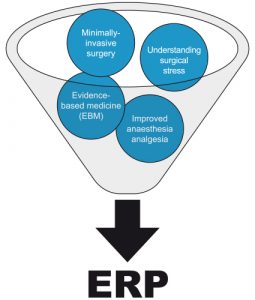ERP is a modern concept of care developed initially in the 90’s by some Scandinavian teams. It is a group of pre, intra and postoperative measures aiming to reduce the surgical stress. There is no contra-indication to ERPs, but a tailored approach according to the context of care and the patient’s conditions. (See the infography)
ERPs are followed in the majority of cases by a better postoperative recovery, lower overall morbidity, and consequently a shorter hospital stay.
ERPs involve an organisational chapter (which is similar to that of ambulatory or day-case surgery). The patient is a major actor of his own care, and the team spirit is of paramount importance. The audit of practices is also a component of the programme. Finally, because of the early discharge, the risk management is also essential. The ERP concept includes both the preoperative preparation (the prehabilitation) and the post-discharge surveillance.
ERP is beneficial to the patients (less morbidity and better recovery), the teams (team spirit) and the society.

Enhanced recovery (or fast-track surgery) is a set of measures taken before, during and after surgery aimed at reducing the stress of surgical trauma.
It is based on three key principles:
Furthermore, the fast recovery method concerns the many different specialists involved in the care of a patient: anaesthetists, surgeons, nutritionists, nurses, nursing auxiliaries, physiotherapists, administrative personnel, in both the public and private sector.
Caring for patients under the best conditions and ensuring better postoperative convalescence are the main priorities throughout the hospital stay. The whole team are united around the patient to ensure the success of this enhanced recovery.
The participation and compliance of the patient are vital to the success of this management approach, the aim of which is to improve the quality of care and reduce the effects of surgical injury.
All the practices diffused by GRACE have been the subject of extensive scientific studies which have proved their efficacy and validated the patient management protocols. The result of these rehabilitation procedures is a reduction in postoperative complications and a shorter duration of convalescence.
Copyright © 2018 - Conception-réalisation K'noë Groupe GET - www.k-noe.fr | Mentions légales | Règlement interne